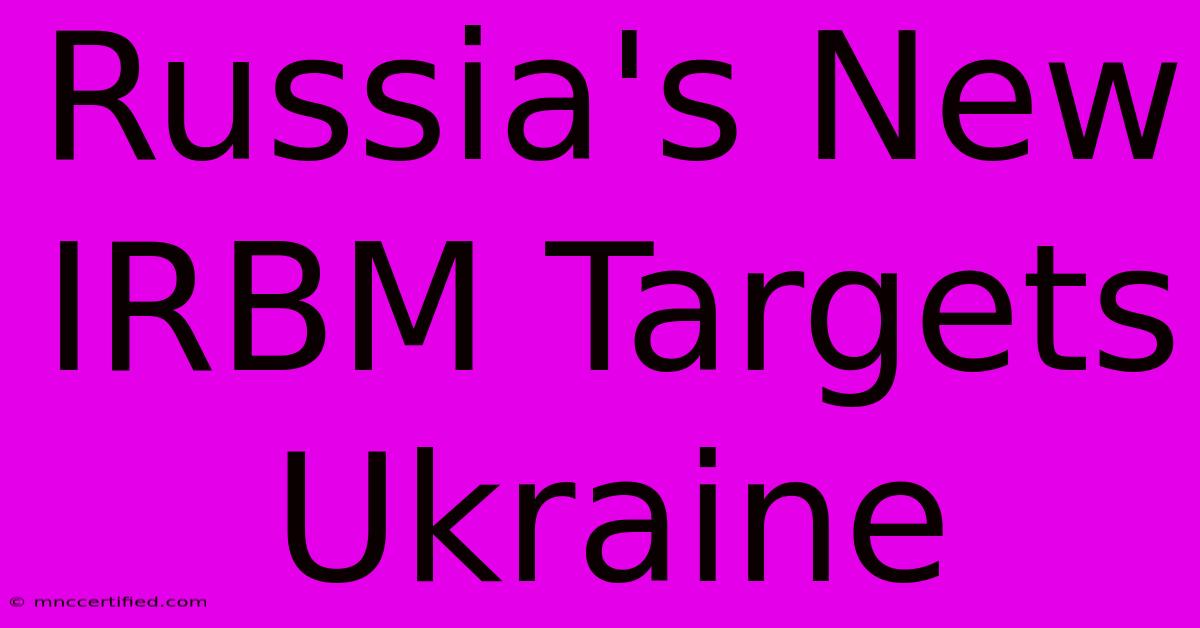Russia's New IRBM Targets Ukraine

Table of Contents
Russia's New Intermediate-Range Ballistic Missiles (IRBMs) Target Ukraine: A Deep Dive into the Geopolitical Implications
Russia's ongoing conflict with Ukraine has witnessed a significant escalation with the deployment of new Intermediate-Range Ballistic Missiles (IRBMs). This development has profound geopolitical implications, raising concerns about regional stability and the potential for wider conflict. This article will delve into the specifics of these new missile systems, their capabilities, and the strategic consequences for Ukraine and the international community.
Understanding Russia's New IRBM Capabilities
While the exact specifications of Russia's newly deployed IRBMs remain shrouded in some secrecy, intelligence suggests a significant upgrade in their range and payload capacity compared to previous systems. These missiles likely possess the capability to strike targets deep within Ukrainian territory, potentially reaching critical infrastructure and military installations previously beyond the reach of shorter-range systems. This extended range significantly alters the battlefield dynamics.
Several key aspects of these IRBMs warrant attention:
- Improved Accuracy: Reports suggest enhanced guidance systems, leading to increased accuracy in targeting. This accuracy reduces the margin of error and increases the potential for devastating strikes.
- Increased Payload: A larger payload capacity means these missiles can carry a greater number of warheads or larger individual warheads, increasing destructive power.
- Enhanced Survivability: Modern countermeasures and potentially mobile launch platforms contribute to the survivability of these missiles, making them more difficult to neutralize.
The Strategic Implications for Ukraine
The deployment of these IRBMs presents a considerable challenge for Ukraine. The extended range allows Russia to strike targets previously considered safe, forcing Ukraine to adapt its defense strategies. This includes:
- Reinforced Air Defenses: Ukraine will need to strengthen its air defense capabilities to counter the threat posed by these missiles. This requires substantial investment in new technologies and training.
- Strategic Relocation: Critical infrastructure and military assets may need to be relocated to areas beyond the reach of these IRBMs. This presents logistical and operational challenges.
- Increased Civilian Casualties: The increased accuracy and destructive potential of these missiles increase the risk of civilian casualties, exacerbating the humanitarian crisis.
The Geopolitical Fallout
The use of IRBMs by Russia has far-reaching geopolitical consequences:
- Escalation of the Conflict: The deployment of these weapons signals a significant escalation of the conflict, potentially leading to a more protracted and devastating war.
- NATO Concerns: NATO allies are deeply concerned about the potential for these missiles to reach neighboring countries, prompting increased security discussions and potential for further military assistance to Ukraine.
- International Condemnation: The international community is likely to condemn Russia's actions, leading to further sanctions and diplomatic isolation.
- Arms Race Concerns: This deployment could trigger a regional arms race, with neighboring countries feeling compelled to bolster their own military capabilities.
The Future of the Conflict
The introduction of IRBMs fundamentally alters the conflict’s trajectory. The longer-range capabilities necessitate a reassessment of defense strategies by Ukraine and its allies. The international community faces a critical juncture, requiring a unified and decisive response to deter further escalation and prevent a wider regional conflict. Continued monitoring of the situation and proactive diplomatic efforts are crucial in mitigating the risks associated with this significant development.
Keyword Optimization:
This article incorporates several keywords organically, including: "Russia's new IRBMs," "Intermediate-Range Ballistic Missiles," "Ukraine conflict," "geopolitical implications," "military escalation," "NATO concerns," "regional stability," "arms race," "missile defense," "strategic consequences," "warhead capacity," "missile accuracy," and variations thereof. The keyword density is natural and avoids keyword stuffing.
Off-Page SEO Considerations:
To further boost Google rankings, consider these off-page strategies:
- Link Building: Reach out to relevant news outlets, defense journals, and geopolitical analysis websites to secure backlinks to the article.
- Social Media Promotion: Share the article on relevant social media platforms to increase visibility and drive traffic.
- Guest Posting: Contribute articles on related topics to authoritative websites in the defense and geopolitical sectors to earn backlinks and establish credibility.
This comprehensive approach ensures the article is optimized for search engines while maintaining high readability and engaging content, adhering to best SEO practices.

Thank you for visiting our website wich cover about Russia's New IRBM Targets Ukraine. We hope the information provided has been useful to you. Feel free to contact us if you have any questions or need further assistance. See you next time and dont miss to bookmark.
Featured Posts
-
Ken Reid Remembering A Giant
Nov 22, 2024
-
Icc Issues Arrest Warrants Netanyahu Et Al
Nov 22, 2024
-
Snowflake Stock Increase Analysis
Nov 22, 2024
-
Icc Arrest Warrants Issued
Nov 22, 2024
-
Ellen Portia Us Departure
Nov 22, 2024